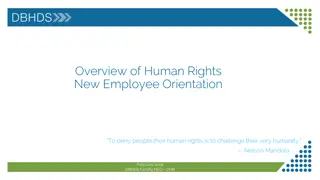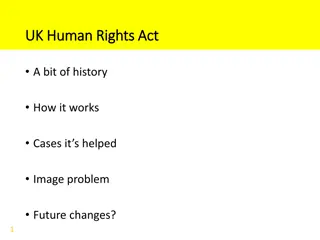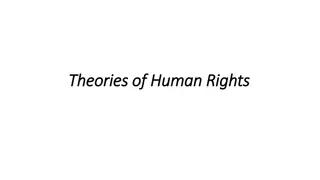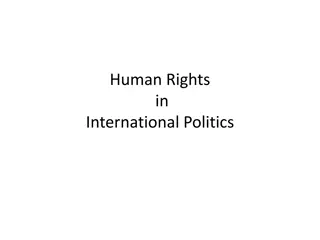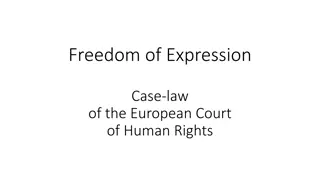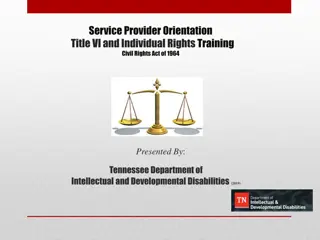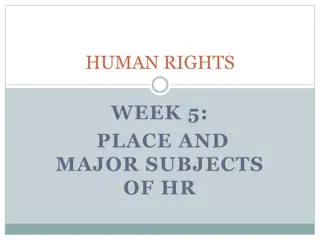Understanding Human Rights: Overview and Evolution
Human rights encompass various aspects such as human needs, generations of rights, individual status, and the indivisibility of rights. Dr. Anna Ledzi ska-Simon discusses the translation of human needs into rights, the historical evolution of rights across generations, individual rights according to Georg Jellinek, and the importance of treating human rights as universal, indivisible, and interdependent.
Download Presentation

Please find below an Image/Link to download the presentation.
The content on the website is provided AS IS for your information and personal use only. It may not be sold, licensed, or shared on other websites without obtaining consent from the author. Download presentation by click this link. If you encounter any issues during the download, it is possible that the publisher has removed the file from their server.
E N D
Presentation Transcript
Introduction to Human Rights Dr Anna ledzi ska-Simon LLM in International and European Law Lecture 5
Human needs O Dignity O Autonomy O Identity O Security O ...all of them are translated into human rights, but the scope of their protection in the personal (who can claim) and material (what) scope differ across jurisdictions O See also Maslow s pyramid of needs: physiological, safety, love, esteem, (https://www.thoughtco.com/maslows-hierarchy- of-needs-4582571) and self-actualization.
Generations of human rights O Generations reflect the historical evolution of human rights. O 1st generation: Civil and political; 2nd generation: Economic, social and cultural. O 1st & 2nd generations are positivized in international treaty law UN Covenants, but also the European Social Charter. O after 1948 UNDHR they remain divided, recently only the EU Charterof Fundamental Rightsencompasses both categories. O 3rd generation of rights developed after 2WW and is dispersed in various treaties or documtents (right to self-determination, humanitarian intervention, environment), the contours of these rights, as well as the corresponding duties are not clear or are in making O The call for 4th generation of rights signals new threats to human dignity and freedom stemming (digitalization) from new technologies
Human rights and individual status O Georg Jellinek: founder of the German theory of individual rights describing different functions of the statevis-a-vis individuals Civil status negativus (negative rights/ freedoms, prohibit state interferance) Political status activus (active rights / freedoms based on participation, require institutions and procedures facilitating participation) Social status positivus/pasivus (pasive rights based on entitlements, require state provision of goods and services) International treatiesand national constitutions guaranteealso Economic rights protection of property, right to work / freedom to choose and exercise one s profession, freedom of economic activity,, but also right to bargaining, strike, etc Cultural a mix of civil rights (freedom of speech), participation rights, but also property protection - - - - -
Indivisibility of human rights O All human rights are universal, indivisible and interdependent and interrelated. The international community must treat human rights globally in a fair and equal manner, on the same footing, and with the same emphasis. While the significance of national and regional particularities and various historical, cultural and religious backgrounds must be borne in mind, it is the duty of States, regardless of their political, economic and cultural systems, to promote and protect all human rights and fundamental freedoms. (point 5 in Vienna Declaration and Programme of Action, 1993. NOTE that political rights are contingent on preexisting civil rights and freedoms (life, liberty, nondiscrimination, due process), while social rights precondition the exercise of civil and political rights. In sum, it is hard to give priority to any of the categories, though they may fall in conflict. All rights have their source in human dignity, therefore all categories of rights should be treated with equal respect Yet, social rights hugely depend on available resources and require state action. In his book Wiktor Osiaty ski talks about social and economic rights but as economic rights he understands entitlements protecting economic security of individuals rather than economic freedoms (see above). O O O O O
Human rights and enforceability O There is a difference between human rights as moral standards and aspirations (moral rights) and human rights as enforceable legal rights (legal rights). Moreover, there is a further difference between constitutional rights which set limit to legislators and statutory rights which limit only the executiveand the judiciary. O The main goal of various social movements (suffragists, anti- slavery, LGBT+, etc) is to translate moral aspirations (of dignity, freedom and equality) into enforceable legal claims. O Enforceability of rights needs to be understood as the availabiliy of legal claims (opening avenues of legal protection such as access toacourt, legal aid, standing, remedies). O In the evolution of human rights the perception that only civil and political rights and freedoms are legally enforceable led to the creation of two separate covenants (ICCPR and ICESCR) and two separatesystems of their implementation.
Social rights O Social rights require an active role of the state as a provider of goods, services or benefits In this regard the state can fulfill the protective, distributory and regulatory role. To social rights count: the right to healthcare, social security (for unemployed, disabled, retired), The right to education, Protectionof motherhood and family Protection of other vulnerable persons: with disabilities, veterans, elderly The right to housing, food, water... NOTE that the text of the ICESCR focuses on state obligations, yet these obligations correspond to individual rights (see Articles 11-14) Some of these needs can be fulfilled by private actors (private insurers). O O - - - - - - O
Are social rights human rights? O Social rights cannot be secured by legislation, yet, legislation should strive to accomplish their full protection (obligation of progressive realization), in contrast civil and political rights can be claimed hereand now O social rights are indeterminate (less determinate as to their material scope what can be claimed than civil and political rights) O Not universal (apply to specific groups in need), yet, everyone can actually be in need O Demoralizing (they imply that the state plays a protective role, but also paternalizing, in contrast to liberal theory according to which individuals take responsbility for their actions and bearconsequences of their misfortune
Do social rights cost more? O Social rights are primarily realized through thestate O Yet, also civil (protection of private life) and political rights (voting, right to information) require state action and imply costs (protection of assemblies against counterdemonstrators, elections) O The concept of positive obligations applies also to civil and political rights and imply that the state has the duty to establish procedures and effectively use them to protect individuals from violations of thier rights by state officials, butalso by privateactors. organization of certain institutions or
Positive obligations O Nowadays, even civil rights or freedoms such as right to respect of private life generate positive obligations of the state (to provide procedures necessary to protect individuals from the undesired interferenceinto their private life by third parties). O POSITIVE OBLIGATIONS characteristic of positive obligations is that they in practice require national authorities to take the necessary measures to safeguard a right7 or, more precisely, to take the necessary safeguard a right or, more specifically, to adopt reasonable and suitable measures to protect the rights of the individual https://rm.coe.int/168007ff4d) : the prime measures to (further see
Social rights in constitutions O In political rights and social benefits are restricted to citizens. After all, such rights involve expenditures and arise from the social and political relations within a society. However, it makes equal sense that noncitizens who participate in such relations should not be deprived of relevant rights. O In the EU, noncitizens who are permanent residents have the right to vote in elections to local self- governments. In some countries, social rights are also extended to those non citizens who are permanent residents and pay taxes, because such rights are perceived as based on cooperation. (Osiaty ski 2012: 94). the majority of contemporary constitutions, the principle of social
Social rights and citizenship O The global tendency to restrict access to citizenship has to do with expanding positive obligations of the state towards its citizens. On the one hand, restrictive citizenship laws contribute to growing number of stateless persons. On the other hand, states encourage foreign nationals to gain citizenship by investment. O The Western (European) conditioned on the economic growth (prosperity) to finance social benefits. Yet, this model presumes that there are more people who are economically active than those who are the recipients of social benefits. The model of welfare democracy is rooted in the principle of solidarity, which has stronger tradition in Europe than elsewhere in the world. model of welfare is
Social rights in the US O Lochner era: the judicial policy of the US Supreme Court to invalidate social legislation as contrary to the protection of property and freedom of contract O Lochner v. New York, 198 US 45 (1905) O The experiences of Great Depression in 1930s O Roosevelt Freedom from want (1941) O Obama Affordable Healthcare Act (2010) turns 10 this year
Social citizenship in the EU O European social security coordination, as a condition enabling free movement of persons within the EU (governed by the principles of: only one legislation applicable; - equality of treatment; - aggregation of the insurance, residence or work periods; and - exportof benefits.) O Access to and portability of social security rights (ie. unemployment, family benefits, pensions) from home to host country (and back) ~ primarily granted to the economicallyactivecitizens health insurance, and O In addition, access to social welfare rights to non-nationals as a pulling force for migration and its political consequences (further https://onlinelibrary.wiley.com/doi/full/10.1111/imig.12607) see
Social Rights in the EU Charter of Fundamental Rights O See Title Solidarity O The reason for the British opposition to ratify the Charter O See the so-called British Protocol O The CJEU held that it was not an opt-out, but a clarification of the scope of application of the Charter (Joined Cases C-411/10 and C-493/10, N.S. v Home Secretary and M.E. Commissioner [2011] ) v. Refugee Applications O UK could not claim that social rights which are enshrined in the Charterare not justiciable in the areasof EU law O Yet, the British Protocol had in fact a substantive meaning with regard to rights in the Charter which do not refer to national lawsor practice.
New enforcement mechanism under the ICESCR O International Covenant on Economic Social and Cultural Rights (1966) the obligation to gradually realize social rights (binding the legislatures) O Optional Protocol to ICESCR (2008) provides the Committee competence consider communications from individuals claiming that their rights under the Covenant have been violated. The Committee may also, under certain circumstances, undertake inquiries on grave or systematic violations of any of the economic, social and cultural rights set forth in the Covenant, and consider inter-state complaints https://www.ohchr.org/EN/HRBodies/CESCR/Pages /CESCRIntro.aspx) to receive and (further see
Conclusions O Some constitutions do not guarantee social rights but call them directive principles of state policy (India, Ireland, Portugal, Spain) they are binding on legislatures O Conceptual differences between rights and principles (they are not directly justiciable unless they are implemented in statutory laws) O Justiciability of social rights generally only in the scope provided in the law O Overall, international or constitutional guarantees of social rights do not givea straightfoward answer to what and who is protected O The concept of the essential core of social rights leaves the question of what is actually protected to the courts (further see https://lawdigitalcommons.bc.edu/cgi/viewcontent.cgi?article=19 20&context=lsfp)



